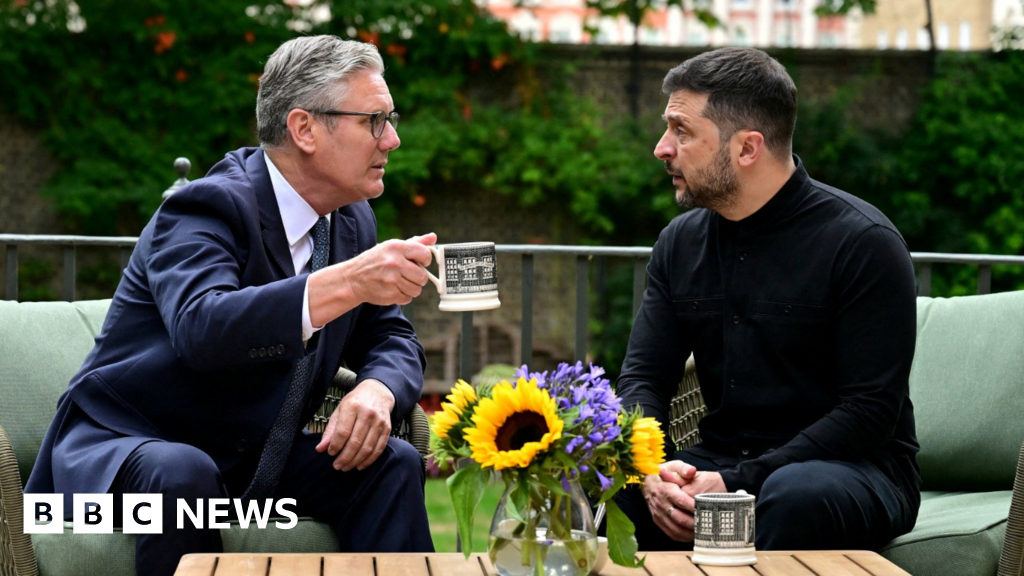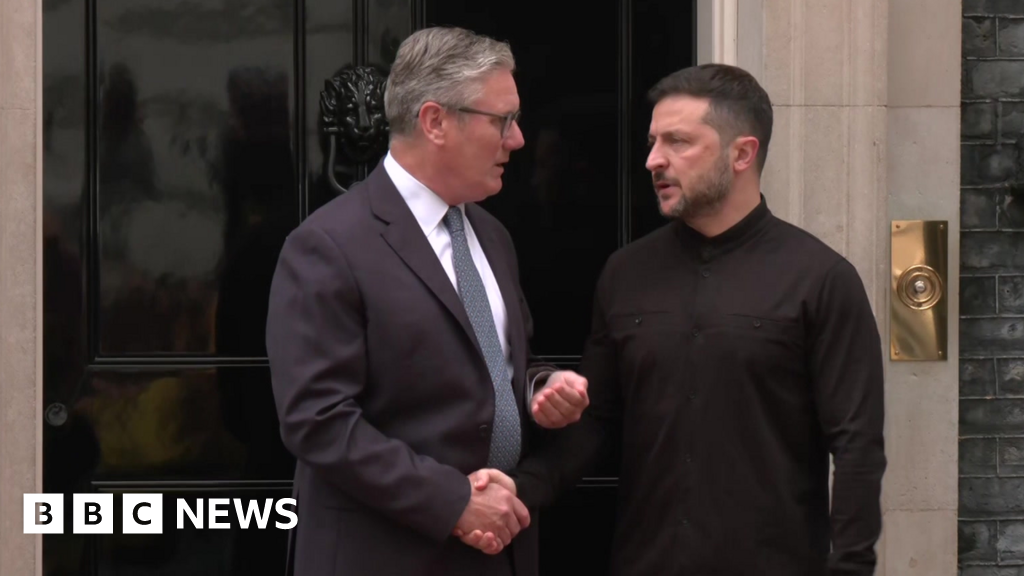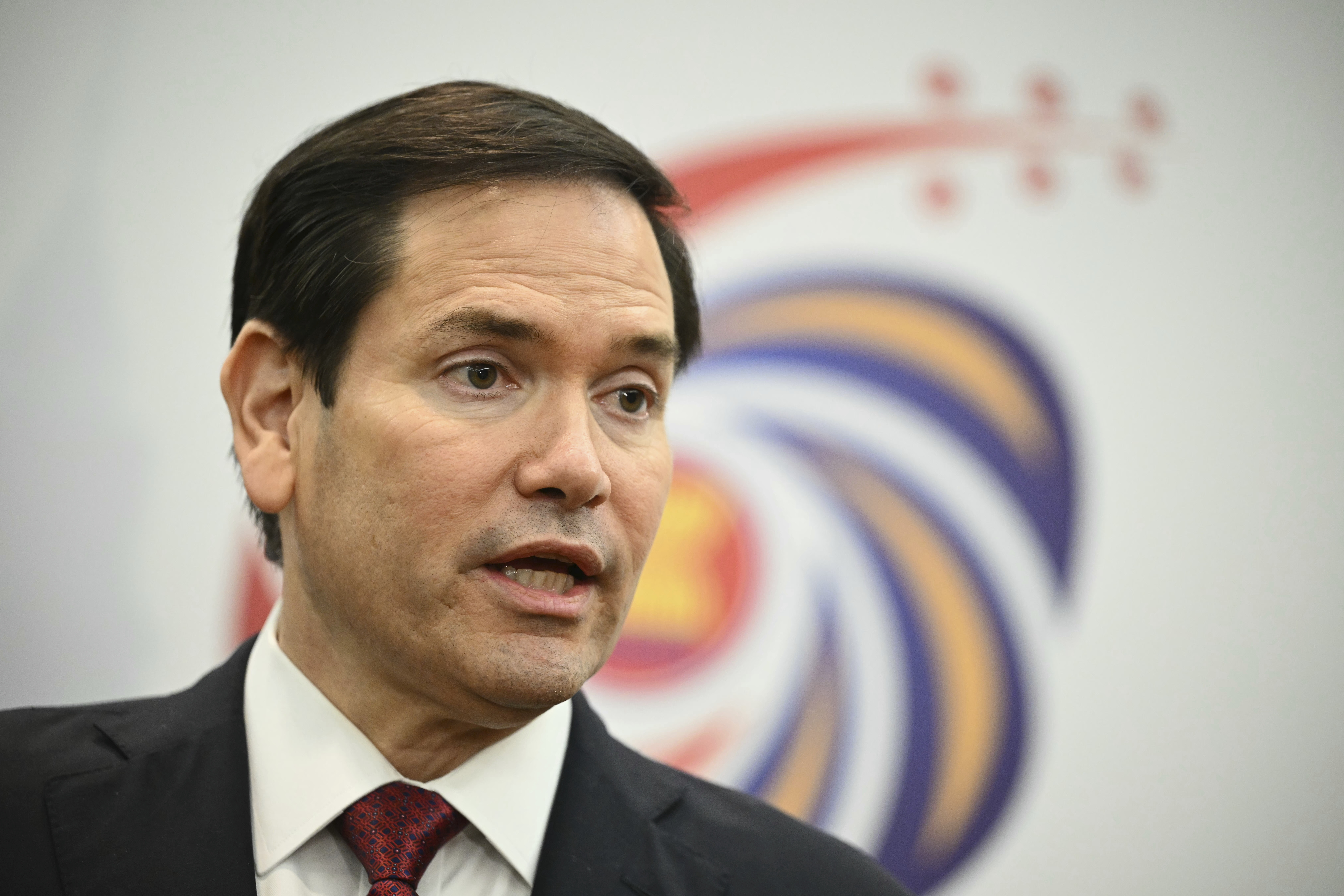Sir Keir Starmer and Ukrainian President Meet in Show of Unity

Introduction
Sir Keir Starmer, leader of the UK's Labour Party, met with Ukrainian President Volodymyr Zelensky in London to discuss the upcoming summit between US President Donald Trump and Russian President Vladimir Putin. The meeting was seen as a show of unity and support for Ukraine's sovereignty and security.
Key Details
Sir Keir Starmer praised Zelensky's leadership and strong stance against Russian aggression, stating that their conversation reaffirmed a "powerful sense of unity" between the UK and Ukraine. They also discussed the ongoing conflict in eastern Ukraine and the importance of finding a peaceful resolution. Starmer emphasized the need for continued support and solidarity from the international community, particularly in light of the upcoming Trump-Putin meeting.
Impact
This show of unity between the UK and Ukraine sends a strong message to both Russia and the United States. It highlights the importance of standing together in the face of global challenges, and serves as a reminder of the ongoing crisis in eastern Ukraine. The meeting also shows the UK's strong commitment to supporting Ukraine's sovereignty and security, and serves as a reminder of the shared values and interests between the two countries.
About the People Mentioned
Sir Keir Starmer
Sir Keir Rodney Starmer, born September 2, 1962, in London, England, is a British politician and barrister who has been serving as Prime Minister of the United Kingdom since July 5, 2024. He is the leader of the Labour Party, a position he has held since April 2020, and has represented the parliamentary constituency of Holborn and St Pancras since 2015. Starmer’s legal career began after qualifying as a barrister in 1987; he gained recognition for providing pro bono legal defense to prisoners on death row in Commonwealth countries and later worked as a legal adviser to the Northern Ireland Policing Board following the Good Friday Agreement. Starmer was appointed Queen’s Counsel (QC) in 2002 and served as Director of Public Prosecutions and head of the Crown Prosecution Service from 2008 to 2013. In this role, he led reforms to maintain justice delivery amid public service cuts and oversaw significant cases, including the prosecution related to the Stephen Lawrence murder and improvements in support for victims of sexual and domestic violence. For his services to criminal justice, he was knighted in 2014. Entering politics, Starmer held roles as Shadow Immigration Minister (2015–2016) and Shadow Secretary of State for Exiting the European Union (2016–2020). After winning Labour’s leadership in 2020, he steered the party toward a more centrist platform compared to the previous leadership under Jeremy Corbyn. Starmer introduced a policy framework in 2023 focusing on five national missions addressing the economy, crime, the NHS, education, and climate change. As Prime Minister, Starmer holds several traditional roles including First Lord of the Treasury, Minister for the Civil Service, and Minister for the Union, overseeing government functions across the United Kingdom. His career reflects a consistent emphasis on justice, public service, and political leadership during challenging times for the UK.
Volodymyr Zelensky
Volodymyr Zelensky is a Ukrainian politician and former comedian who was born on January 25, 1978, in Kryvyi Rih, Ukraine. Prior to his political career, he gained fame as an actor and comedian, notably for his role in the TV series "Servant of the People," where he portrayed a teacher who becomes president. This role ironically foreshadowed his future as the sixth president of Ukraine, a position he assumed on May 20, 2019, after winning the presidential election on April 21, 2019[1][2][4]. Zelensky's presidency has been marked by significant challenges, including the COVID-19 pandemic and escalating tensions with Russia. His leadership during these crises has been notable, particularly his response to the Russian invasion of Ukraine in February 2022. He became an international symbol of resistance, refusing evacuation offers and rallying global support for Ukraine. Under his leadership, Ukraine has received substantial international military and financial aid[1][3]. One of Zelensky's key achievements is his ability to unite Ukrainians and communicate effectively with the international community. His presidency has been recognized globally, with Time Magazine naming him Person of the Year in 2022 for his leadership during the Russian invasion[1][3]. Despite lacking prior political experience, Zelensky has demonstrated resilience and strategic communication skills, which have been crucial in navigating Ukraine through its most challenging moments. Currently, Zelensky remains a central figure in international politics, especially in the context of the ongoing conflict with Russia. His commitment to defending Ukraine's sovereignty has garnered widespread support, both domestically and internationally. Zelensky is married to Olena Zelenska and has two children, balancing his public duties with family life[1][4].
Donald Trump
Donald John Trump, born June 14, 1946, in Queens, New York, is an American businessman, media personality, and politician. He graduated from the University of Pennsylvania’s Wharton School in 1968 with a degree in economics. In 1971, he took over his family’s real estate business, renaming it the Trump Organization, through which he expanded into building and managing skyscrapers, hotels, casinos, and golf courses. Trump gained widespread fame as the host of the reality TV show *The Apprentice* from 2004 to 2015, which helped establish his public persona as a successful entrepreneur. Trump entered politics as a Republican and was elected the 45th president of the United States, serving from 2017 to 2021. His presidency was marked by significant policy actions including tax cuts, deregulation, the appointment of three Supreme Court justices, renegotiation of trade agreements (notably replacing NAFTA with the USMCA), and a focus on immigration control including border wall expansion. He withdrew the U.S. from international agreements such as the Paris Climate Accord and the Iran nuclear deal, and engaged in a trade war with China. His administration’s response to the COVID-19 pandemic was criticized for downplaying the virus’s severity. Trump was impeached twice by the House of Representatives—first in 2019 for abuse of power and obstruction, and again in 2021 for incitement of insurrection—but was acquitted by the Senate both times. After losing the 2020 election to Joe Biden, Trump challenged the results, culminating in the January 6, 2021, Capitol riot. He remains a central figure in American politics, having won the 2024 presidential election and returned as the 47th president in 2025, continuing to promote policies aimed at economic growth, border security, and military strength[1][2][3][4].
Vladimir Putin
Vladimir Putin is the current President of Russia, a position he has held for multiple terms since 2000, with a brief interlude as Prime Minister from 2008 to 2012[1][3]. Born in Leningrad (now Saint Petersburg) in 1952, Putin began his career in the Soviet Union’s security services, joining the KGB in 1975 and rising to the rank of Lieutenant Colonel by the time he left in 1991, following postings in East Germany and Leningrad[4]. After the Soviet Union’s collapse, he transitioned into politics, serving as an adviser to Saint Petersburg Mayor Anatoly Sobchak and later moving to Moscow, where he held various administrative roles under President Boris Yeltsin[6]. Putin was appointed Prime Minister in August 1999 and became acting President when Yeltsin unexpectedly resigned that December[3][6]. He won his first presidential election in March 2000, promising to stabilize Russia’s economy and political system after the tumultuous 1990s[3][7]. During his initial terms, he centralized power, reasserted federal control over Russia’s regions, and curtailed the influence of the country’s oligarchs through legal and economic measures[7]. Putin was re-elected in 2004 but, due to constitutional term limits, stepped aside in 2008, becoming Prime Minister under his successor Dmitry Medvedev, while retaining significant influence[3]. Constitutional amendments later extended presidential terms, and Putin returned to the presidency in 2012[1]. Putin’s time in office has been marked by assertive foreign policy, including military interventions in Syria in support of President Bashar al-Assad and the 2014 annexation of Crimea, which led to international sanctions[1]. Domestically, his tenure has seen increased state control over media, the suppression of political opposition, and constitutional changes consolidating executive authority[1]. In 2022, Russia’s full-scale invasion of Ukraine triggered a major international crisis, further isolating Russia from the West and prompting widespread condemnation[1]. As of 2025, Putin remains a dominant figure in Russian politics, having secured another term in office through constitutional changes that allow him to potentially remain president until 2036[1]. His leadership continues to shape Russia’s domestic trajectory and its role in global affairs, amid ongoing conflict in Ukraine and strained relations with NATO and Western countries[1].
About the Organizations Mentioned
Labour Party
The Labour Party is a prominent political organization in the United Kingdom, known for its democratic socialist ideology and commitment to improving the lives of working people. Founded to give ordinary people a voice, the party has a rich history spanning over a century, with significant achievements in power that have shaped Britain's social and economic landscape. **Organization and Structure** The Labour Party is a membership organization comprising individual members, Constituency Labour Parties (CLPs), affiliated trade unions, socialist societies, and the Co-operative Party. It operates under a democratic framework, with key decision-making bodies including the National Executive Committee (NEC), Labour Party Conference, and the National Policy Forum (NPF). The party's structure allows for diverse participation, enabling members to influence policy and leadership selection[2][3]. **History and Achievements** Historically, Labour has been instrumental in implementing landmark policies such as the National Health Service (NHS), social security systems, and comprehensive education. The party has also played a crucial role in advancing workers' rights and promoting social justice. Notable leaders include Clement Attlee, Harold Wilson, and Tony Blair, each contributing to significant reforms during their tenures[7]. **Current Status** Currently, the Labour Party is led by Keir Starmer, who has outlined five key missions for a future Labour government. The party continues to be a major force in British politics, with a strong presence in local and national elections. The annual Labour Party Conference is a significant event, attracting thousands of delegates and featuring policy discussions, keynote speeches, and fringe events[1][4]. **Notable Aspects** The Labour Party's commitment to social and economic reform aligns with broader interests in business and technology, particularly in areas like sustainable development and digital inclusion. The party's emphasis on community engagement and policy innovation also resonates with those interested in societal impact and technological advancement. As a major political entity, the Labour Party remains central to British political discourse, shaping policies that influence both domestic and
Ukrainian President
## Overview The “Ukrainian President” is not a traditional organization, but rather a constitutional office and the highest political authority in Ukraine. The President of Ukraine serves as the Head of State and acts as the guarantor of the country’s sovereignty, territorial integrity, and constitutional order[1]. The office’s functions, powers, and election procedures are defined by the Constitution of Ukraine, which positions the President as a central figure in both domestic governance and international relations[1]. ## History and Role The modern Ukrainian presidency was established with the adoption of Ukraine’s Constitution in 1996, following the country’s independence from the Soviet Union in 1991. The President is elected by direct popular vote for a five-year term and cannot delegate core powers to others[1]. The officeholder’s responsibilities include ensuring the protection of citizens’ rights and freedoms, representing Ukraine internationally, and overseeing the implementation of constitutional norms[1]. ## Key Achievements Under President Volodymyr Zelenskyy (inaugurated in 2019), Ukraine has seen significant legislative and anti-corruption reforms, including the removal of parliamentary immunity and efforts to reduce oligarchic influence in media and politics[2]. Zelenskyy’s wartime leadership since Russia’s full-scale invasion in 2022 has been widely recognized for rallying international support and maintaining national morale, with his approval ratings soaring to historic highs and stabilizing at 67% in 2025—well above those of his predecessors[3]. ## Current Status Despite ongoing conflict and internal challenges, the Ukrainian presidency remains a symbol of resilience and reform. Zelenskyy’s administration continues to focus on increasing domestic weapons production and modernizing the country’s defense sector in response to the ongoing war[4]. Public trust in the presidency is notably higher than in Ukraine’s broader political leadership, reflecting the office’s unique role in times of crisis[3]. ## Notable Aspects The Ukrainian presidency’s prominence in
United States
The **United States** is a federal republic and a global superpower, playing a leading role in economics, military strength, technology, and governance. It is a nation of approximately 348 million people as of 2025, characterized by its diverse population and dynamic economy[8][6]. Founded in 1776 following independence from British rule, the U.S. rapidly evolved into a major world power, especially after World War II, when its technological and economic investments solidified its global dominance[4]. Today, it remains the world’s preeminent military power, with 76% of Americans recognizing this status, while about half view it as the leading economic power globally, though China is seen as a rising competitor[2][3]. The U.S. government operates through a complex system that manages federal finances, taxation, social welfare programs, and trade policies. Recent legislative changes, such as the 2017 Tax Cuts and Jobs Act and the 2025 One Big Beautiful Bill Act, have shaped the tax landscape to influence economic growth, labor markets, and federal revenue[1]. Despite challenges like rising federal deficits projected to reach 6.9% of GDP by 2027, consumer spending remains resilient, and business investment is expected to grow steadily in 2025[5]. In governance, the U.S. is rated "Free" with a score of 84/100 by Freedom House, though concerns about democratic erosion and partisan conflicts persist[6]. Public trust and satisfaction with government services fluctuate, reflecting ongoing debates about policy effectiveness and institutional competence[7]. Technologically, the U.S. maintains a critical edge, underpinning its economic and geopolitical power. Experts warn, however, that technological dominance is not guaranteed indefinitely, emphasizing the need for adaptive policies and international cooperation to sustain leadership in innovation and global affairs[4]. Overall, the United States remains a pivotal force in global business, technology, and politics, balancing historic strengths with contemporary challenges in
Russia
Russia, officially known as the Russian Federation, is not an organization but a sovereign state and the largest country in the world by land area, spanning Eastern Europe and northern Asia. With a population of nearly 144 million as of 2025, Russia ranks ninth globally by population and is characterized by significant ethnic diversity, with over 80% identifying as ethnic Russians and numerous minority groups contributing to its cultural tapestry[4]. The capital, Moscow, is a major global city and the country’s political, economic, and technological hub. ## Historical Overview Russia’s history is marked by its transformation from the Tsarist Empire to the Soviet Union and, after its dissolution in 1991, to the present-day Russian Federation. The post-Soviet era saw Russia’s integration into the global economy, though it retained a centralized political system with power concentrated in the presidency[7]. The country’s economy, historically resource-based, relies heavily on oil, gas, and minerals, but has also developed significant industrial, technological, and military sectors. ## Economic Profile and Key Achievements Russia’s economy is the world’s twelfth-largest consumer market, with about 70% of GDP driven by domestic consumption[1]. It has a “very high” Human Development Index ranking and boasts the fifth-highest number of billionaires globally, though income inequality and regional disparities remain pronounced[1]. Major achievements include surviving extensive Western sanctions after the 2022 invasion of Ukraine, maintaining economic stability through increased military spending, and pivoting energy exports to Asia[1][5]. The country has also played a leading role in the BRICS bloc, advocating for reforms in the international financial system and promoting technological innovation among developing economies[6]. ## Current Status and Challenges As of late 2025, Russia’s economy is experiencing a pronounced slowdown, with GDP growth cooling to around 1% after robust expansion in 2023–2024[2][3]. High military expenditure (


















